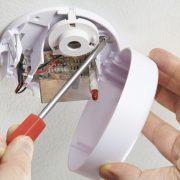Preventative Measures to Keep Your Home Fire Safe
Every year the fire department receives thousands of reports of house fires. Sometimes there is only material damage, but every year there are hundreds of wounded and dozens of deaths. Fire can be prevented, but you have to take measures. Together with the fire department we provide you wir=th tips on how you can prevent this from happening to you.
How quickly does a fire seize itself?
It depends on the fire load; That is the amount of combustible materials in a room. ‘An oak armchair from the old days hardly burned, but nowadays they are made of cheaper wood and materials which burn very quickly. Make sure to close doors at night. If there is a sudden fire at night, open doors ensure that a fire is fueled. Choose smoke detectors that are audible.
What causes a fire?
The fire service writes that the three most common causes of fire are: heating, cooking and an electrical appliance. If you have a chimney and fireplace, make sure you have clean and dry firewood that has been dried for at least a year and a half. You have to have your chimney cleaned and checked every year by a professional company.
The oven, fryer and microwave are often a source of a fire in the kitchen, but one can also be caused by a pan on the stove. Therefore, use a kitchen timer and make sure that you do not have flammable items around the stove.
The washer and dryer are also possible causes of fire. Clean the filters and clean under and behind the appliances once a year.
Fire? What do you do?
Is there a fire in the pan? Then close it with the lid and not with water. Turn off the extractor and do not walk with the pan. Chimney fires can best be extinguished with sand and by closing the chimney flap. Do not throw water onto the fire, an explosion may occur. If there is a fire starting in the house, it is best to extinguish it yourself with a fire extinguisher. Use short blows and only do so if you do not end up in danger yourself. If the fire starts to blow quickly, alert the fire department by calling 911.
Tips
Here are some preventative measures you should take to reduce the risk of fire as much as possible.
- Place smoke detectors and a fire blanket on every floor.
- Do you have a back door? Make sure that there is a key in there so that you can always go outside.
- Keep a large fire extinguisher in the house.
- Fire extinguishers are not eternally sustainable. You have to have it inspected every two years.
- If you have a smoke channel or chimney in the house have it cleaned at least once a year. Bird nests can be built inside them.
- There is a danger of carbon monoxide in winter. Therefore, install carbon monoxide detectors or fire/carbon monoxide combination detectors.
- Dust that collects in ventilation areas are very sensitive to fire.
- Sockets are very useful, but if you plug in too many chargers that require a lot of power, there is a risk of a shorting a circuit and fire.
- Washing machines and dishwashers can catch fire due to a short circuit, because there is too much dust in them, they are overloaded or too old.
- Do you have halogen lamps? It is better not to have them too close to the curtains or ceiling. Replace them with LED or energy-saving lamps.
- Nights on the couch with a candle on the table can be very nice, but also dangerous. Make sure that the holder or jar is a non-combustible material. Do not place candles near curtains either.
- Install a fire blocker. This device you place on the inside of a dryer or washing machine. Fire extinguisher will be released automatically in case of fire.
- In bed, an electric blanket can be very nice, but due to overheating or short-circuiting such a blanket can cause fire. Check before use after taking it out of the closet if it was stored for a long time and check the blanket before putting it in bed.






